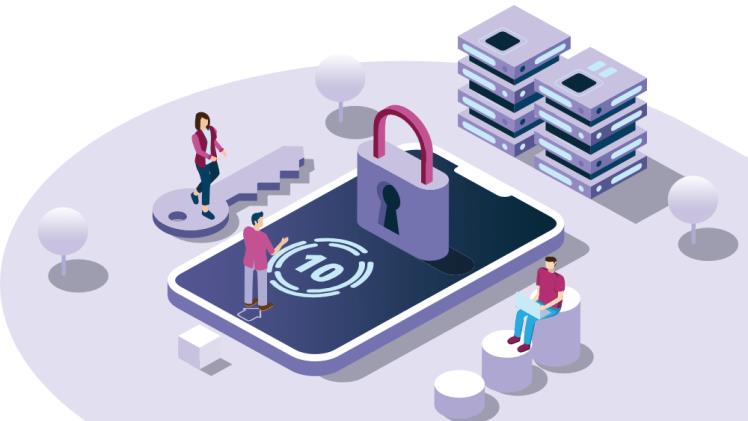Introduction
From online banking and shopping to social media and cloud storage, much of our lives now happen in the digital realm. While technology has made life more convenient, it has also introduced significant risks. Data breaches, identity theft, phishing scams, and ransomware attacks are more common than ever.
In this connected age, protecting your personal and business data isn’t optional—it’s essential. This article provides practical, easy-to-follow steps to help safeguard your data and maintain your digital security.
1. Use Strong, Unique Passwords
Weak or reused passwords are one of the most common causes of data breaches. Always create complex, unique passwords for each of your accounts.
Tips:
- Use a mix of letters, numbers, and special characters
- Avoid using obvious information (like birthdays or names)
- Change passwords regularly
- Use a reputable password manager (e.g., LastPass, 1Password, Bitwarden) to store them securely
2. Enable Two-Factor Authentication (2FA)
Two-factor authentication adds an extra layer of security by requiring you to verify your identity with a second method (such as a text message, email, or app-generated code) after entering your password.
Why it matters: Even if someone steals your password, they won’t be able to access your account without the second factor.
3. Keep Software and Devices Updated
Outdated software often contains security vulnerabilities. Regularly update your operating system, apps, browsers, and antivirus software to patch known weaknesses.
Include:
- Smartphones
- Computers
- Browsers
- Firewalls and routers
- Antivirus and anti-malware tools
Enable automatic updates whenever possible.
4. Be Wary of Phishing and Scams
Phishing attacks trick you into providing sensitive information or clicking malicious links—often via fake emails, texts, or websites.
How to spot phishing attempts:
- Poor grammar or spelling
- Suspicious links or urgent requests
- Emails from unknown senders or odd-looking addresses
- Fake login pages mimicking trusted sites
Best practice: Never click unknown links or download attachments unless you’re certain they’re safe. Always verify directly with the sender.
5. Use Secure Networks
Public Wi-Fi networks (e.g., in cafes, airports, hotels) are convenient but can be insecure.
Tips to stay safe:
- Avoid accessing sensitive accounts (like banking) on public Wi-Fi
- Use a VPN (Virtual Private Network) to encrypt your internet connection
- Stick to secure websites that begin with “https://”
6. Backup Your Data Regularly
Accidents, cyberattacks, or hardware failure can result in data loss. Always maintain up-to-date backups of your important files.
How to back up:
- Use cloud services (Google Drive, Dropbox, iCloud)
- Store copies on external hard drives
- Automate regular backups whenever possible
Having both local and cloud backups ensures redundancy.
7. Limit What You Share Online
Oversharing on social media can unintentionally reveal personal details—making it easier for hackers to guess passwords or security answers.
Smart habits:
- Set social profiles to private
- Don’t share sensitive info like your address, phone number, or full birthdate
- Be mindful of location-sharing features
8. Secure Your Devices
Protect physical access to your devices with:
- Passwords, PINs, or biometric locks (face/fingerprint recognition)
- Auto-lock settings
- Remote wipe capabilities in case your phone or laptop is lost/stolen
Also, encrypt your devices to protect data even if the hardware is compromised.
9. Monitor Your Accounts and Credit
Keep an eye on your financial and online accounts for suspicious activity. Many banks and services offer alerts for unusual login attempts or transactions.
You should also:
- Check your credit report regularly
- Sign up for identity theft protection services if needed
Early detection is key to limiting damage from breaches.
10. Educate Yourself and Others
Cyber threats evolve quickly. Staying informed about new scams and security practices helps you stay one step ahead.
Consider:
- Following trusted tech blogs or cybersecurity experts
- Watching tutorials on security settings
- Teaching family members (especially children and seniors) about digital safety
In workplaces, regular employee training on cybersecurity best practices is crucial.
Conclusion
As the digital world expands, so do the risks. But with proactive habits and the right tools, you can protect your data, your identity, and your peace of mind. Digital safety doesn’t require tech expertise—it just takes awareness, vigilance, and consistency.
Start today by reviewing your passwords, enabling 2FA, and updating your software. The steps may seem small, but they can make a world of difference in keeping your data safe.
FAQs: How to Protect Your Data in an Increasingly Digital World
1. Why is data protection so important in today’s digital age?
As more personal and financial activities move online, the risk of cyber threats like identity theft, data breaches, and scams increases. Protecting your data helps prevent financial loss, privacy violations, and unauthorized access to your accounts.
2. What is the best way to create a strong password?
Use a combination of uppercase and lowercase letters, numbers, and special characters. Avoid using common words or personal information. A password manager can help generate and store strong, unique passwords for each account.
3. How does two-factor authentication (2FA) help?
2FA adds an extra layer of security by requiring a second form of verification—like a text message or authentication app code—after entering your password. It greatly reduces the risk of unauthorized access.
4. Should I use public Wi-Fi?
Public Wi-Fi is not secure. Avoid accessing sensitive accounts (like banking) while on public networks. If necessary, use a VPN to encrypt your connection and protect your data.
5. How can I recognize a phishing scam?
Watch out for:
- Emails or messages with urgent or threatening language
- Misspellings or grammatical errors
- Suspicious links or fake login pages
- Requests for personal or financial information
Always verify the sender and URL before clicking.
6. What is a VPN, and do I need one?
A VPN (Virtual Private Network) encrypts your internet connection and hides your IP address. It’s especially useful when using public Wi-Fi or accessing sensitive data remotely.
7. How often should I back up my data?
Ideally, back up important files daily or weekly, depending on how frequently your data changes. Use both cloud storage and external drives for added security.
8. What’s the safest way to store sensitive personal information?
Use encrypted storage tools, password managers, and secure cloud services. Avoid storing sensitive data in plain text or unsecured documents.
9. How can I tell if my data has been compromised?
Watch for unusual account activity, unfamiliar logins, or alerts from services like HaveIBeenPwned. Also, monitor your credit reports and financial statements regularly.
10. How can I help others stay safe online?
Educate friends, family, and coworkers about safe online practices. Share resources, help set up secure accounts, and encourage them to use tools like password managers and 2FA.







